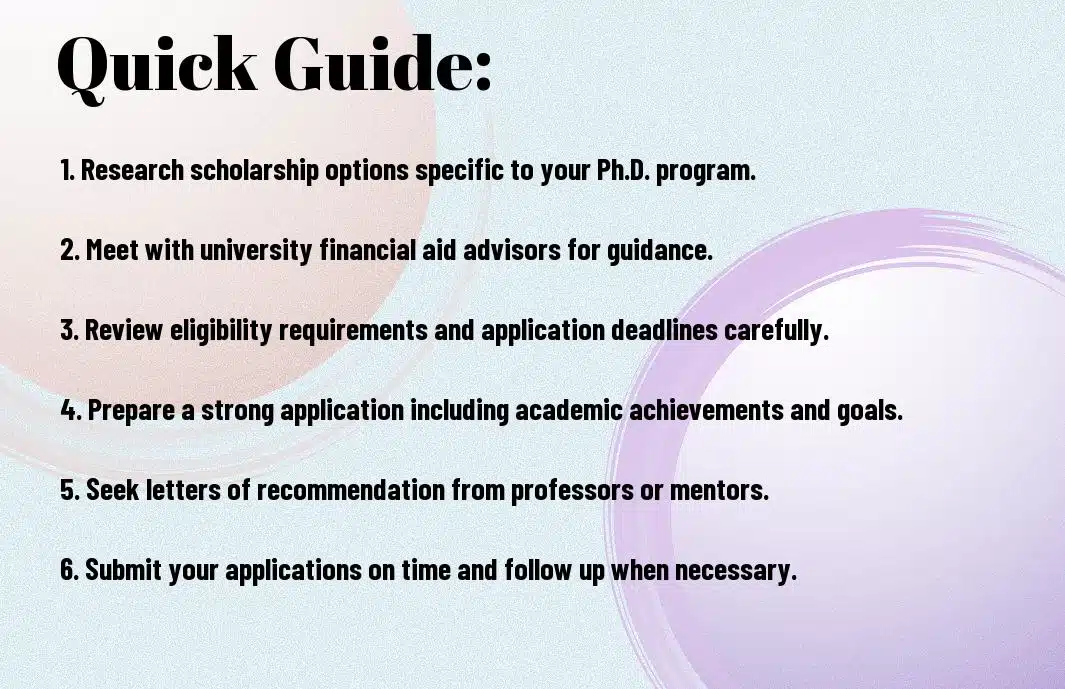This comprehensive guide will help you navigate the intricate world of university scholarships for your Ph.D. program. Securing funding for your doctoral studies is crucial yet challenging, as the competition is fierce and the stakes are high. By understanding the different types of scholarships available, how to find them, and what it takes to qualify, you can increase your chances of receiving financial support for your academic pursuits. Follow these expert tips and strategies to unlock opportunities and make your Ph.D. journey more affordable.
Key Takeaways:
- Research Early: Start researching scholarship opportunities well in advance to meet application deadlines and requirements.
- Diversify Your Options: Look beyond university-specific scholarships and explore external organizations, government grants, and fellowships.
- Customize Your Applications: Tailor your scholarship applications to highlight your academic achievements, research interests, and unique qualifications for a competitive edge.

Types of Ph.D. Scholarships
Any individual considering pursuing a Ph.D. knows that the financial aspect of such an endeavor is crucial. Ph.D. scholarships can provide the necessary funding to support your academic journey. Understanding the different types of scholarships available is important to navigate this world successfully.
| Merit-Based Scholarships | Need-Based Scholarships |
|---|---|
| – Academic excellence required | – Based on financial need |
| – Evaluation of research potential | – Income level and resources considered |
| – Competitive selection process | – Awarded to students with demonstrated need |
| – Recognizes and rewards talent | – Aimed at ensuring access to education |
| – Encourages academic excellence | – Helps bridge financial gaps |
Merit-Based Scholarships
On the merit-based side, scholarships are awarded based on academic excellence, research potential, and talent. Competitive selection processes are usually in place to identify the most deserving candidates. Recognition and encouragement of academic achievements are key components of these scholarships.
Need-Based Scholarships
Types of scholarships that are need-based rely on the financial circumstances of the applicant. Aiming to support students who might not have the means to pursue a Ph.D., these scholarships consider income levels and available resources. Financial need is the primary criterion for eligibility, helping bridge the gap between academic potential and financial constraints.
Field-Specific Scholarships
Types of scholarships that are field-specific are designed to support students pursuing Ph.D. degrees in particular disciplines. Another form of tailored financial assistance, these scholarships focus on advancing research and expertise in specific areas of study.
University-Funded Scholarships
The university-funded scholarships are an important resource for Ph.D. students, as they are offered directly by the educational institution. The university allocates funds to support students based on various criteria, including academic merit and financial need. Availability and application procedures for these scholarships may vary among universities.
Externally-Funded Scholarships
Leveraging externally-funded scholarships can provide additional financial support to Ph.D. students. Little external organizations, specialized foundations, and government agencies offer scholarships for students pursuing advanced degrees. Applying for these scholarships may involve different processes and requirements compared to university-funded options.
Step-by-Step Guide to Applying for Ph.D. Scholarships
Identifying Potential Scholarship Opportunities
Assuming you are considering pursuing a Ph.D., the first step is to identify potential scholarship opportunities. Start your search by exploring university websites, scholarship databases, and academic forums. Look for scholarships that align with your research interests, academic achievements, and career goals.
Preparing a Strong Application
Now that you have shortlisted potential scholarships, focus on preparing a strong application. Tailor your CV, research proposal, and personal statement to showcase your academic achievements, research experience, and passion for your field of study. Request letters of recommendation from professors who can attest to your academic abilities and research potential.
Navigating the Application Process
Application deadlines and requirements can vary for each scholarship. Create a checklist to ensure you gather all necessary documents, submit your application on time, and follow all instructions carefully. Stay organized, keep track of deadlines, and reach out to scholarship providers if you have any questions.
Key Deadlines and Time Management Strategies
With Ph.D. scholarships, time management is crucial. Set up a timeline with key deadlines for each scholarship you are applying to. Prioritize tasks, allocate time for researching, writing, and revising your application materials. Stay ahead of deadlines to avoid last-minute stress and ensure that your application is polished and stands out to the selection committee.
Factors to Consider When Searching for Scholarships
After deciding to pursue a Ph.D., the next step is to secure funding for your studies. Navigating the world of university scholarships can be overwhelming, but considering the following factors can help streamline your search process:
Eligibility Requirements
The first step in searching for scholarships is to carefully review the eligibility requirements for each opportunity. Academic achievements, research interests, financial need, and personal background are common factors that funders consider. Make sure you meet all the criteria before applying to maximize your chances of success.
Scholarship Amount and Duration
When searching for scholarships, it is crucial to consider the amount and duration of funding offered. Some scholarships may cover partial tuition while others may provide full funding for the entire duration of your Ph.D. program. Understanding the financial commitment required and the length of support can help you plan your academic journey effectively.
Duration: It is crucial to confirm the duration of the scholarship to ensure that it aligns with the timeline of your Ph.D. program. Be aware of any terms and conditions regarding funding renewal or extension to avoid any unexpected financial burdens.
Researching the Funder’s Objectives
Little is known about the importance of researching the funder’s objectives in the scholarship application process. Understanding the goals and values of the organization offering the scholarship can help you tailor your application to align with their mission. This demonstrates your commitment and enhances your chances of securing funding.
It is recommended to thoroughly analyze the funder’s website, previous scholarship recipients, and any available annual reports to gain insights into their priorities and preferences.
Additional Benefits and Opportunities
Researching additional benefits and opportunities offered along with the scholarship can add significant value to your academic experience. Networking events, mentoring programs, conference funding, and professional development workshops are examples of additional benefits that can enrich your Ph.D. journey.
For instance, scholarships that provide opportunities for international collaboration or industry placements can enhance your research skills and broaden your academic horizons.
Tips for Success in Securing Ph.D. Scholarships
Despite the competitive nature of Ph.D. scholarships, there are strategic approaches you can take to increase your chances of success. Here are some key tips to guide you through the process:
- Building a Robust Academic Profile: You need to demonstrate a strong academic background with excellent grades, research experience, and publications.
- Crafting Compelling Personal Statements: While your academic achievements are crucial, your personal statement is where you can showcase your passion, motivations, and future goals in a way that sets you apart from other applicants.
- Seeking Recommendations and Endorsements: You should seek recommendations from professors or professionals who can speak to your academic abilities, research potential, and personal qualities that make you a strong candidate.
- Remaining Persistent and Resilient in the Application Process: Seeking Ph.D. scholarships can be a lengthy and challenging process, but staying persistent and resilient in the face of rejections or setbacks is crucial to eventual success.
Building a Robust Academic Profile
You need to focus on excelling in your coursework, conducting impactful research, and actively participating in academic conferences or seminars to build a strong academic profile that will impress scholarship committees.
Crafting Compelling Personal Statements
While grades and test scores are important, your personal statement provides a unique opportunity to showcase your personality and motivations. Highlight your research interests, career goals, and how the scholarship will help you achieve them.
Seeking Recommendations and Endorsements
You should approach potential recommenders early and provide them with relevant information about your accomplishments and goals. Select individuals who can provide specific examples of your skills and potential as a Ph.D. candidate.
Remaining Persistent and Resilient in the Application Process
Seeking Ph.D. scholarships can be a long and arduous journey. Rejections are common, but it’s crucial to stay focused on your goals, learn from each application, and continually improve your materials to increase your chances of success.
Pros and Cons of Different Scholarship Avenues
Many students pursuing a Ph.D. explore various avenues to secure scholarships for their studies. Each option comes with its own set of advantages and disadvantages, as outlined in the table below.
| Pros | Cons |
| Merit-Based Scholarships | Highly competitive |
| Need-Based Scholarships | Financial documentation required |
| Subject-Specific Scholarships | Limitations on research areas |
| Government-Funded Scholarships | Stringent eligibility criteria |
| Corporate Sponsorships | May come with work obligations |
Evaluating Full vs. Partial Funding Offers
Avenues
When considering funding offers for your Ph.D., it is crucial to weigh the benefits of full funding against the potential limitations of partial funding. Full funding offers may provide financial security but could come with more stringent academic requirements.
Weighing Teaching and Research Assistantships
Assistantships
Understanding the differences between teaching and research assistantships is necessary when making decisions about your Ph.D. studies. Teaching assistantships involve assisting professors in classes, while research assistantships focus on research projects.
Considering the Impact of Scholarship Conditions
There’s
Teaching and research assistantships can provide valuable experience and networking opportunities, but they may also require a significant time commitment that could impact your research progress. It’s important to carefully consider how assistantships align with your academic and career goals.
To wrap up
With these considerations in mind, navigating the world of university scholarships for your Ph.D. can be a daunting task, but a rewarding one. By conducting thorough research, understanding the requirements and deadlines, building a strong application, and seeking out both internal and external funding opportunities, you can increase your chances of securing financial support for your advanced studies. Remember to stay organized, persistent, and open to all potential avenues of financial aid. Pursuing a Ph.D. is a significant investment in your future, and finding the right scholarships can help alleviate some of the financial burdens along the way. Good luck on your scholarship search!
Also Read: The Benefits Of Securing A Scholarship For Your University Ph.D. Program
FAQs
Q: What types of scholarships are available for Ph.D. students?
A: There are various types of scholarships available for Ph.D. students, including merit-based scholarships, need-based scholarships, research grants, departmental scholarships, and external scholarships from public and private organizations.
Q: How can I find relevant scholarships for my Ph.D. program?
A: To find relevant scholarships for your Ph.D. program, you can start by researching scholarship databases, university websites, professional organizations, and government agencies. It is also important to reach out to your academic department and faculty members for potential scholarship opportunities.
Q: What tips can help me navigate the world of university scholarships for my Ph.D.?
A: To navigate the world of university scholarships for your Ph.D., consider the following tips:
1. Start early and research scholarship opportunities well in advance.
2. Tailor your applications to meet the specific requirements of each scholarship.
3. Build strong relationships with professors and academic advisors who can provide recommendations.
4. Stay organized and keep track of application deadlines.
5. Apply to as many scholarships as possible to increase your chances of receiving funding.





